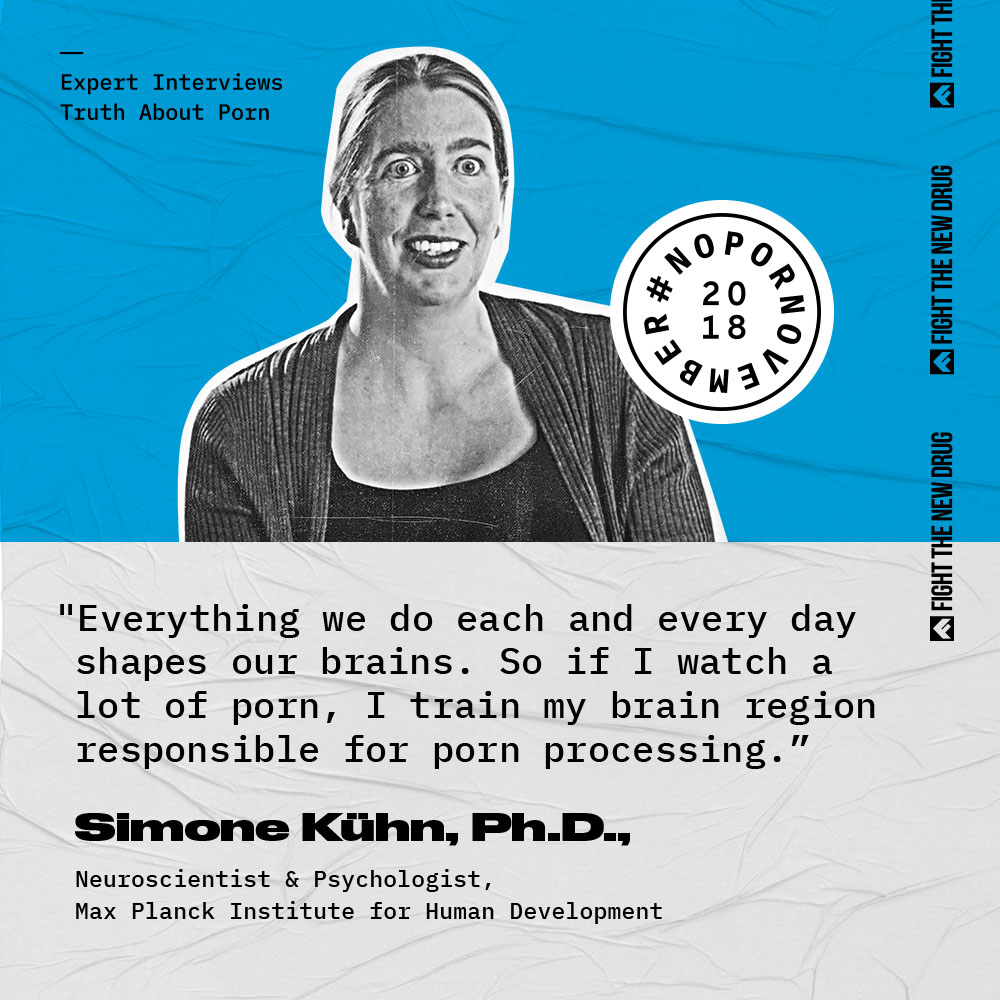Consider this: understanding the function of chemicals in the most powerful sex organ in the body—the brain—can be a game-changer for those who consume porn.
If you’ve ever had thoughts like, “Why can’t he/she just stop?” or “Something is seriously wrong with me. I’ll never be able to get over this,” recent research on the impact porn has on the brain might change your perceptions.
A little scientific understanding goes a long way when it comes to empathy for those who struggle or hope in your own recovery journey.
Chemicals in the brain during porn consumption
Neurochemicals act as ingredients in a sort of neuro-cocktail that, during a healthy sexual experience, trigger feelings of pleasure and bonding, followed by relaxation and ongoing longing for one’s partner. The problem is, porn can short-circuit this otherwise healthy system.
Related: How Watching Porn Can Mess With Your Brain—Literally
Here are some of the neurochemicals that play a role in sexual pleasure.
Dopamine. This provides a powerful craving for a particular stimulus. It gives your brain a feeling of “I want that, and I want it right now.” Dopamine supplies a rush of pleasure as a “reward” for certain behaviors and nudges you to remember and repeat those behaviors.
Norepinephrine. Like adrenaline, this builds anticipation and makes you alert and focused. It also helps create long-term “sexual memories” for future recall. [1]
Oxytocin. Also known as the “bonding” or “cuddle” hormone, oxytocin is released when couples express intimacy. It’s one of the reasons a kiss can feel so powerful and triggers a bond between partners.
Endorphins. These natural opiates send a rush of pleasure, sometimes referred to as a “high,” throughout the entire body during a sexual experience. [2]
Serotonin. After a sexual release, serotonin brings a sense of calm, relaxation, and satisfaction with what has just occurred. [3]
These chemicals act as biological motivators and reward us for having healthy sexual experiences. They draw us back to certain behaviors—with the ultimate goal being mutual happiness, satisfaction, and a close bond with another human.
For a lot of people, often starting around age 11, porn hijacks this process, and the associated natural urges and curiosities. Many become dependent on a stimulus that offers a cheap counterfeit for what they naturally yearn for.
They may not understand why no matter how hard they try to stop, they keep turning back to behaviors that harm them.
How gaining knowledge fueled this man’s recovery
Some people believe that becoming dependent on porn means being stuck forever. But the harm porn causes to the brain is reversible, and understanding this science can be one of the most significant steps to breaking free.
Related: 20 Years Of Looking At Porn And I Wouldn’t Wish This On Anyone
Vinny, Director of Support Groups at the Fortify recovery platform, recently shared his story. This is his experience, in his own words:
“The damaging dialogue we hear from ourselves or others about our struggle with compulsive behaviors can keep us tethered, ball and chain, to them. Our lists of self-defeating thoughts can be long and painful.
These statements create the very environment out of which the behaviors flourish and grow. They are lies, illusions, and powerful self-deceptions—assumptions, not grounded in facts, about why people start and can’t stop their behaviors.
Before I found freedom from pornography, I was like many who have struggled with self-esteem and self-worth. I repeated these condemning statements thousands of times over thirty years. They completely undermined my best efforts to find lasting change.
A great help of the last two decades has been an increase in research regarding the brain science and biological processes taking place in our bodies when we engage with porn. Knowing how the brain works has allowed millions who struggle to overcome stumbling blocks and move forward in recovery.
Hundreds of studies lead to similar conclusions: the body produces chemicals that send messages along neuropathways. They make us feel good, draw conclusions about the behaviors we engage in, and encourage us to do them again and again.
These chemicals make up a neurological recipe of pleasure when we view porn. The takeaway from these discoveries for me was simple: I found the answers to what REALLY fostered my compulsive behaviors.
The behaviors I involved myself in from age 7 until age 42, were NOT because I was a piece of garbage or an addict incapable of ever finding freedom. They were not because I didn’t love my wife and children. For me and so many others, we made a connection with pornography in our childhood years that formed biological consequences—leaving us predisposed to compulsive sexual behaviors that we had absolutely no knowledge about.
When I first tried to stop at age 12, I was scared when I couldn’t. Left to myself, and without access to any clarifying information, I could only come to one conclusion: ‘I must be a bad person, because I’m unable to stop.’ The more I TRIED to stop but failed, the answers deteriorated into darker self-talk, ‘I’m a complete and total loser. I’m worthless. I must be the only person in the world that does this. I wish I was dead.’
All these years later, I realize none of that was true. I wonder how different life might have been had I changed that self-loathing talk to the truth: ‘I’m Vinny. I am a human being with issues, and I’m working on them.’ There would still have been much work to be done, but no longer would I be encumbered by the biggest impediment to hope and change: the lies I tell myself about ME and my behavior.
If we’re in committed relationships, understanding the biology of our behaviors can often moderate the overwhelming feelings of betrayal felt by our spouses and partners. It doesn’t excuse the behavior, but more understanding can lead to more compassion, and open doors for healing.
If you’re struggling, I urge you to learn about the science behind your behaviors and what’s going on inside your body. It can dispel so many damaging myths that keep us chained to the behaviors we so desperately seek to escape from.
All of this information creates hope—without which, we often give up the quest for freedom.”
Powerful, right? Now, Vinny has a private coaching practice working with those struggling with compulsive porn use. If you’re feeling stuck in your journey toward recovery, check out our friends at Fortify to join a supportive community.
Knowledge empowers us to fight
Learning, applying, and sharing the science behind how porn impacts the brain is not only helpful, but crucial when it comes to making a dent on this issue.
By replacing critical assumptions with knowledge based on the scientific facts behind compulsive porn consumption, we can better support those seeking recovery, and those struggling can better understand themselves.

Citations
[1] William Struthers, Wired for Intimacy: How Pornography Hijacks the Male Brain, pg. 90. (InterVarsity Press, 2009). Dr. Struthers, Ph.D., is a neurobiologist and associate professor of psychology at Wheaton College, Wheaton, Illinois.
[2] Struthers, Wired for Intimacy, pg. 100, 104.
[3] Mark Kastleman, The Drug of the New Millennium, The Brain Science Behind Internet Pornography Use, pgs. 77, 84, 92 (PowerThink Publishing, 2007).
Your Support Matters Now More Than Ever
Most kids today are exposed to porn by the age of 12. By the time they’re teenagers, 75% of boys and 70% of girls have already viewed itRobb, M.B., & Mann, S. (2023). Teens and pornography. San Francisco, CA: Common Sense.Copy —often before they’ve had a single healthy conversation about it.
Even more concerning: over half of boys and nearly 40% of girls believe porn is a realistic depiction of sexMartellozzo, E., Monaghan, A., Adler, J. R., Davidson, J., Leyva, R., & Horvath, M. A. H. (2016). “I wasn’t sure it was normal to watch it”: A quantitative and qualitative examination of the impact of online pornography on the values, attitudes, beliefs and behaviours of children and young people. Middlesex University, NSPCC, & Office of the Children’s Commissioner.Copy . And among teens who have seen porn, more than 79% of teens use it to learn how to have sexRobb, M.B., & Mann, S. (2023). Teens and pornography. San Francisco, CA: Common Sense.Copy . That means millions of young people are getting sex ed from violent, degrading content, which becomes their baseline understanding of intimacy. Out of the most popular porn, 33%-88% of videos contain physical aggression and nonconsensual violence-related themesFritz, N., Malic, V., Paul, B., & Zhou, Y. (2020). A descriptive analysis of the types, targets, and relative frequency of aggression in mainstream pornography. Archives of Sexual Behavior, 49(8), 3041-3053. doi:10.1007/s10508-020-01773-0Copy Bridges et al., 2010, “Aggression and Sexual Behavior in Best-Selling Pornography Videos: A Content Analysis,” Violence Against Women.Copy .
From increasing rates of loneliness, depression, and self-doubt, to distorted views of sex, reduced relationship satisfaction, and riskier sexual behavior among teens, porn is impacting individuals, relationships, and society worldwideFight the New Drug. (2024, May). Get the Facts (Series of web articles). Fight the New Drug.Copy .
This is why Fight the New Drug exists—but we can’t do it without you.
Your donation directly fuels the creation of new educational resources, including our awareness-raising videos, podcasts, research-driven articles, engaging school presentations, and digital tools that reach youth where they are: online and in school. It equips individuals, parents, educators, and youth with trustworthy resources to start the conversation.
Will you join us? We’re grateful for whatever you can give—but a recurring donation makes the biggest difference. Every dollar directly supports our vital work, and every individual we reach decreases sexual exploitation. Let’s fight for real love:




